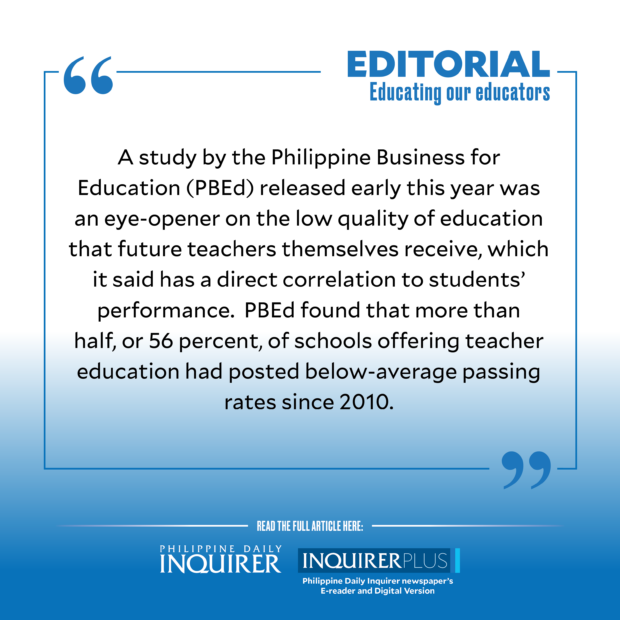Educating our educators

Thanks to a novel program of the Commission on Higher Education (CHEd) and the Philippine Embassy in Phnom Penh, Filipino teachers who have been getting low salaries despite working for many years in Cambodia now have a chance to upgrade their skills and get better opportunities abroad.
Through the Developing Global Filipino Teachers (DGFT) program, Filipino teachers who have yet to be licensed by the Professional Regulation Commission (PRC) are offered help in passing the exam, while those who are already in service get to enhance their competencies on 21st-century pedagogy, global citizenship and internationalization, digital literacy, and ethical values, according to CHEd chair Prospero De Vera III.
The program was conceptualized in 2019 after the Philippine Embassy alerted the CHEd about the plight of some 1,000 Filipino teachers who have been working in the Cambodian capital for many years, but were poorly paid because they have yet to get their PRC license.
Elephant in the roomDe Vera sought the help of Saint Paul University, Cebu Normal University, and the Philippine Normal University, considered as centers of excellence in teacher education, and the program was launched in October 2020.
De Vera said some of the 16 Filipino teachers who passed the PRC exam in Bangkok in September trained under the DGFT. After this initial success, De Vera said the CHEd plans to expand the DGFT to other countries to reach more overseas Filipino teachers.
The DGFT is indeed a laudable undertaking that addresses the elephant in the room: Are teachers in our own country receiving as much help to become better educators?
One difficult issue in the national conversation about the worsening quality of education in the Philippines—as seen in the bottom ranking of Filipino students in a global literacy assessment—is the quality of our teachers.
Below-average passing ratesA study by the Philippine Business for Education (PBEd) released early this year was an eye-opener on the low quality of education that future teachers themselves receive, which it said has a direct correlation to students’ performance. Using 12 years’ worth of data on the results of the PRC’s teacher licensure examination for teachers (LET), PBEd found that more than half, or 56 percent, of schools offering teacher education had posted below-average passing rates since 2010.
“Poor performance (in LET) puts teacher quality into question,” PBEd executive director Justine Raagas said during the release of the study in February.
CHEd definitely has its work cut out for it in addressing the dismal passing rate of these schools. It can expend the same vigor and determination it puts into turning overseas Filipino teachers into world-class educators. Indeed, what has been done to put these underperforming schools into shape, and to review their curriculum to make it at par with 21st-century pedagogy?
The Department of Education (DedEd) should exert a more sustained effort on the “upskilling” of public school teachers, while relieving them of bureaucratic requirements that take much of their time away from teaching.
Weak teaching methodsA Unicef report in 2019, titled “Upgrade teachers’ knowledge and skills to deliver quality education for all Filipino children,” pointed out that preservice training alone, or the four-year course to get a teaching degree, “does not necessarily equip teachers with sufficient knowledge and skills to teach in the classroom.”
Education Secretary Sara Duterte had acknowledged the need to upgrade teachers’ competencies, noting that the recent review of the K-12 program found “weak teaching methods” on critical thinking, problem-solving, and other skills needed to respond to modern times. At the same time, she noted that teachers were not to blame for these shortcomings.
“The sad reality is the system has failed them; this is a system that burdens them with backbreaking and time-consuming administrative tasks, a system that provides no adequate support and robs them of the opportunity to professionally grow and professionally teach, assist, and guide learners,” she said.
Burdensome ancillary tasksOne of the burdensome ancillary tasks for teachers is the annual performance review requirement which, according to the Alliance of Concerned Teachers (ACT), involves tedious tasks and voluminous paperwork. Scrapping this requirement is in fact on ACT’s Christmas list, a timely gift that DepEd can give teachers this season.
A thorough review of the system that has failed our teachers—from their university education to the classroom environment where they teach—is necessary if the government were to solve the glaring education crisis. Teachers have been suffering long enough, with low salaries, delayed benefits, overcrowded classrooms, lack of instructional materials, and the many extraneous tasks passed on to them such as serving during local and national elections.
As Duterte correctly observed, “Our teachers must return to classrooms and they must teach.” It’s time to see these words put into actual use.




















